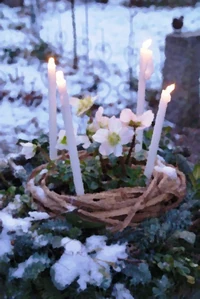| Imbaelk | |
|---|---|
 Imbolc Candles in Snow, photo by Sonja Bannick | |
Also called |
Imbolc, Candlemas, Sprouting |
Observed by |
humans, elves, halflings, possibly dwarves and gnomes |
Type |
Cultural, seasonal, magical |
Significance |
Heralds the end of winter and forthcoming spring; beginning of Imbaelk savaed. |
Celebrations |
Feasting, visiting holy wells, blessing and lighting candles, weather divination |
Date |
1 or 2 February |
Related to |
Imbaelk savaed, Elven calendar |
Imbaelk, also known as Imbolc,[1] is celebrated in February as according to the elven calendar, giving a name to the third savaed of the year. It heralds the end of winter and is often called "Sprouting" in Common Speech.
Magical Holidays[ | ]
Notes[ | ]
- Imbolc is a celebration among some Celtic cultures in the real world.
- Traditions: The holiday is a festival of the hearth and home, and a celebration of the lengthening days and the early signs of spring.
Celebrations often involve hearthfires, special foods, divination or watching for omens, lighting candles or a bonfire if the weather permitted. Fire and purification is an important part of the festival. The lighting of candles and fires represents the return of warmth and the increasing power of the Sun over the coming months. In some regions blessed candles are lit during storms and placed in windows to ward off thunders.
Imbaelk is also traditionally a time of weather divination - people are making predictions about weather in the coming year.
- Traditions: The holiday is a festival of the hearth and home, and a celebration of the lengthening days and the early signs of spring.
References[ | ]
- ↑ David French's translation
| This page uses content from Wikipedia. The original article was at Imbolc. The list of authors can be seen in the page history. As with Witcher Wiki, the text of Wikipedia is available under the GNU Free Documentation License. |
| This page uses content from Wikipedia. The original article was at Candlemas. The list of authors can be seen in the page history. As with Witcher Wiki, the text of Wikipedia is available under the GNU Free Documentation License. |
